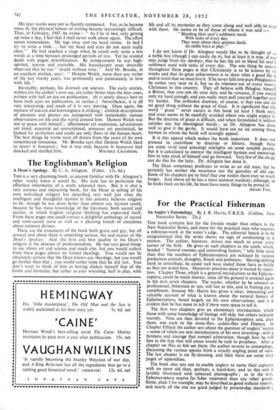The Englishman's Religion
A Dean's Apology. By C. A. Alington. (Faber. 12s. 6d.) THIS is a very charming book, as anyone familiar with Dr. Alington's other works knew it would be. His style has to perfection the effortless informality of a really educated man. But it is also a very curious and interesting book, for the Dean in telling of his own individual religion has described, very well just what the intelligent and thoughtful layman in this country believes religion to be, though he has done better than almost any layman could, because he has more knowledge of the literature, both sacred and secular, in which English religious thinking has expressed itself. From these pages one could extract a delightful anthology of sacred and semi-sacred verse as well as a pleasing bunch of anecdotes about eminent divines.
These are the ornaments of the book both grave and gay, but all around and about them is something serious, the real matter of the Dean's Apology. And the first and best quality in the Dean's religion is the absence of professionalism. He has very good things to say about art and science and much else, but you would collect from these pages almost no formal theology. You would not be absolutely certain that the Dean knows any theology, but you would go further than that ; you would rather hope that he did not. You don't want to think of him as having shaken himself free of the forms and formulas, but rather as ever wrestling, half in play, with life and all its mysteries as they come along and well able to cope with them. He seems to be of those of whom it was said :— " Blending their soul's sublimest needs With tasks of every day, They went about their greatest deeds As noble boys at play."
I do not know if Dr. Alington would like to be thought of as a noble boy (though I can easily do it), but at least it is true, if one may judge from his Apology, that he has the art to blend his soul's sublimest need with tasks of every day. The one thing he asserts throughout these pages is that Christianity is to be known by its works and that its great achievement is to show what a good life is and to insist that we must live it. If he never falls into pure Pelagianism he comes very near to it, but so do nineteen out of every twenty Christians in this country. They all believe with Pelagius, himself a Briton, that you can do your duty and be virtuous, if you would only try hard enough, and you really must pull yourself together and try harder. The orthodox doctrine, of course, is that you can do no good thing without the grace of God. It is significant that the word " grace " never occurs in this book (at least I think not), and even seems to be carefully avoided where one might expect it. But the doctrine of grace is difficult, and when formulated it seldom satisfies any but theological minds ; so Dr. Alington has done well to give it the go-by. It would have cut no ice among those laymen to whom the book will strongly appeal.
It is this appeal which makes the book important. It does not pretend to contribute to doctrine or history, though there are some vivid (and amusing) sidelights on some notable people, but it is calculated to interest the intelligent layman and encourage him to take stock of himself and go forward. Very few of the clergy can do this for the laity. Dr. Alington has done it.
The Dean sometimes professes to write as an old man, but he certainly has neither the weariness nor the garrulity of old age. Some of his chapters are so brief that one wishes them ever so much longer. And above all he has a most insistent modesty, although, as he looks back on his life, he must have many things to be proud of.
ADAM Fox.


































 Previous page
Previous page